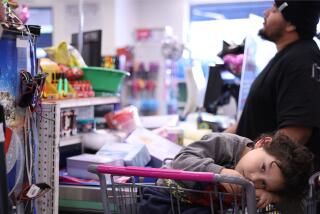2 Housewives Raise a Toast--to Their Baby Bottle : Encinitas Women Strike It Rich, Sell Cherubs to Playtex
- Share via
Two Encinitas housewives were car-pooling their infants to preschool five years ago when the brainstorm hit: why not start a company that sold decorative, “fashion” baby bottles instead of the lackluster, polyurethane containers then dominating the market?
Not only did Jennifer Richards and Linda Geitner, both now 39, take their idea and run with it, they subsequently built a company from scratch called Cherubs that revolutionized the baby-feeding industry. Four years after its founding, the company booked $8.3 million in 1988 sales. Cherubs now employs 60 in a converted Mayfair supermarket on Vulcan Street in Encinitas.
The partners found their pot of gold last month when they sold their young company to Playtex of Stamford, Conn. Richards declined to discuss the sale price but sources close to the company said it was in excess of Cherubs’ 1988 sales of $8.3 million. Thus did the former car-poolers Richards and Geitner, who together owned 80% of Cherubs’ stock, strike it rich.
The Tardy Ones Get Together
Richards said the two women became friendly after they noticed they were always the tardy ones in their car pool at Bethlehem Pre-School, “making the other ladies late for their tennis games.” Geitner, who was traveling Monday and not available for an interview, was an interior designer before quitting to become a housewife full time. Richards, a former registered nurse, has four children, and Geitner has three.
Their success story is one that involves daring, 80-hour work weeks and making huge personal sacrifices: both women are going through divorces and say they regret having spent so much time away from their children during their formative years.
The Cherubs story is also one that hinges on the good will of other successful businesswomen. In an interview Monday, Richards credited the guidance of entrepreneur Sylvia Noble as critical to Cherubs’ success. Noble is a co-owner of No Jo, an Orange County infant bedding company with $30 million in sales that has made several lists of fastest-growing U.S. companies.
The Secret: ‘Just Do It’
Perhaps the most important lesson that Cherubs offers to would-be entrepreneurs is not to be intimidated by any barrier. “We found that the secret to business is there is no secret. Just do it,” said Richards.
Cherubs, for example, would never have succeeded had Richards not been audacious enough to knock on doors that impartial observers might have assumed would be closed to upstarts such as her. In 1985, Richards approached the foundation that owns the Sesame Street label and characters and asked for licensing rights. Although the meeting took place just three months after she and Geitner had formed their company and before making any sales, they got the license and Cherubs was off and running.
Apart from baby bottles, Cherubs makes a line of bibs, pacifiers and other accessories that are characterized by vivid designs, colors and high-quality manufacturing. In addition to Sesame Street, Cherubs licenses National Football League and Major League Baseball logo licensing rights and owns 12 proprietary designs and logos.
When Cherubs’ first line of baby bottles was introduced in 1985, most mothers used nondescript plastic or glass bottles with no lettering or colors. But Richards and Geitner reasoned that, if gaily colored baby clothing, mobiles and furniture could sell, so could bottles. And, if the argument could be made that brightly colored mobiles could stimulate brain development in infants, the same could be said as part of a Cherubs sales pitch.
Starting with just the idea, the two women soon made believers of a group of family and friends who in 1985 invested $80,000 in stock to finance the young company. The cash enabled them to to finance the production of prototypes and appearances at a critical 1985 trade show in Dallas. Cherubs gained credibility by placing a full-page, four-color ad in the trade show program at a time when Cherubs was still operating out of Richards’ garage.
“We couldn’t afford to look too ‘cottage industry,’ ” Richards said.
The pair spent long hours researching designs, colors, production methods and, perhaps the biggest hurdle, obtaining product liability insurance. Once the company was able to show a product to independent sales representatives and prospective customers, the product literally sold itself, Richards said. Nordstrom in San Diego became an early customer, a significant feather in the company’s cap.
“We literally had no competition when we started out” making fashion-oriented baby feeding products, Richards said. From $5,000 in sales in 1985, the company grew to $1.3 million in 1986, to $5.8 million in 1987 and to $8.3 million in 1988. Company sources said Cherubs could have booked $20 million in sales last year if it had had the manufacturing capacity equal to demand.
Competition soon surfaced, and now the baby bottle market is awash in brightly colored products modeled on Cherubs items, Richards said. Cherubs can maintain its market share only by maintaining its reputation for quality, she said.
Cherubs has received buy-out inquiries for the last couple of years. But the pair decided to sell only after running the company became an all-consuming task. Playtex had the good timing to make an offer they could not refuse, Richards said.
Both will continue to work for Playtex in consulting capacities, developing new products and helping out in sales and marketing. Cherubs will remain in Encinitas for the time being, although Richards conceded that chances are good that Playtex will someday move the company to its New Jersey manufacturing complex.
More to Read
Inside the business of entertainment
The Wide Shot brings you news, analysis and insights on everything from streaming wars to production — and what it all means for the future.
You may occasionally receive promotional content from the Los Angeles Times.










